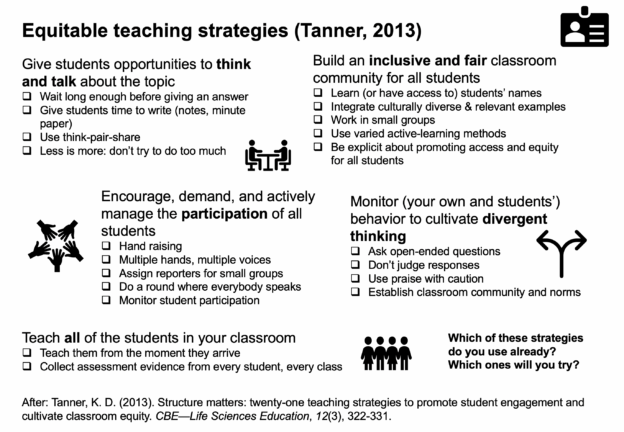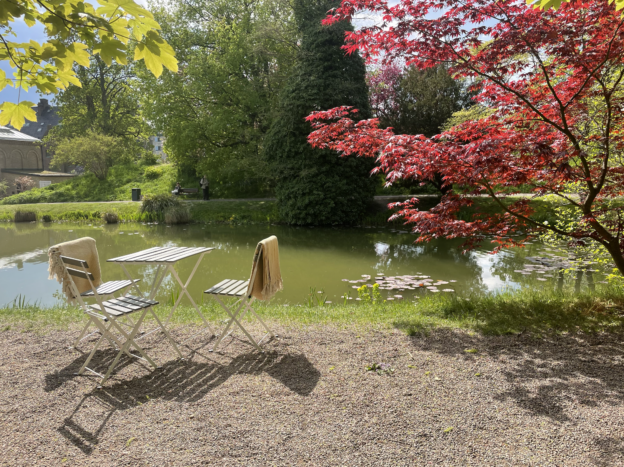[Edit 5.9.2022: I just read “Decolonization is not a metaphor” by Tuck & Yang (2012) and I am very much using decolonization as a metaphor in the blog post below. That does not mean that my thoughts are bad or not important — I think there is still a lot of good stuff in them! — but what I am doing is not decolonialization. So please keep that in mind!]
I just read the article “Decolonizing the Undergraduate Chemistry Curriculum: An Account of How to Start” by Dessent et al. (2022) and found it a really nice and encouraging introduction to a topic that might otherwise seem scary to tackle. Because what does “decolonisation” even mean? If we don’t have colonies any more as a nation, or never had them as a community of scientists, what is there to get rid of? There are of course many structures and relationships that either originated in a colonial system or from similar traditions. Like for example the way we talk about where knowledge comes from and how we hadrly ever question what kind of knowledge is included in curricula. Not reflecting about this is very likely propagating injustice and definitely limiting. Decolonialising in the sense of Dessent et al. (2022) means to “develop a more complete scientific perspective that better includes global voices.” And shouldn’t that always be our goal? For me, this ties in super well with efforts towards diversity, equity and inclusion that I want to strengthen.
The authors present small, manageable steps towards decolonialisation that can be approached one by one rather than all at once (and I am presenting them here with my own thoughts on what that could mean in oceanography):
- finding best practice examples of decolonialising a science department. This is such an obvious starting point, but one worth mentioning. Reading this article is a good start!
- collect good practice examples that already exist at the institution — a great way to increase buy-in and make the efforts feel bottom-up rather than top-down. In oceanography, I know for example of efforts to highlight the role of women: Did you know that Eunice Newton Foote first proposed in 1856 that atmospheric CO2 concentrations would change atmospheric temperatures, a discovery that is commonly attributed to John Tyndall three years later? Or showing Polynesian stick charts that use waves for navigation is quite common in introductory oceanography. But even just writing this, I opened something like 15 new browser tabs with more information on how they worked, because I realise that despite my fascination with all things waves, and despite having showed pictures of them in introductory classes, I have only a very vague understanding of them — much more vague than all the other things I would have shown in that class.
- compiling resources that can be used as starting points for others, or several in their case: (A) a list of Black scientists that have done important work in their field, and (B) a list of scientists from the Indian continent. This point that mostly white men are highlighted is a very obvious starting point in the oceanography context I “grew up in” — at the institutes both in Hamburg and in Bergen it would be very easy to get the impression that all relevant research in oceanography had pretty much happened by our forefathers at each of the institutions, respectively, or at the very least involving cooperation with them. There is a lot of patriotism and pride and culture etc entangled with a tradition of following in the footsteps of Bjerknes & co, but focussing on this too much effectively makes contributions of others invisible. So starting to compile lists of scientists from other regions of the world, or with specific underrepresented characteristics, is a useful start!
- making sure the images displayed in the department show diversity. This brings to mind the galleries of historic oil paintings of all the oceanographic celebrities that are all old white men… Which are all somehow tied in with the history of the institution, yes, but that also paint a very one-sided picture! Plenty of room for improvement there!
- celebrate Black History month. Or maybe, thinking back to the Polynesian stick charts, there are events that could be organised around other traditions that we bring in? I watched a super interesting YouTube video of a 2017 seminar on “Wave Piloting in the Marshall Islands” and they say that wave piloting is easier by night because you aren’t distracted by so many other impressions as when you see the waves. Maybe we could include a session on reading waves in the dark? Or we could look at what other opportunities we might have to showcase diversity, like the international women’s day.
- survey the culture of the department to figure out next steps — always good to get an idea of the baseline we are working with, and the specific needs at our own place!
The authors report on how they approached this with a work group, while always transparent towards the whole department, first focussing on specific parts of their teaching but with the intent to, little by little, look at all areas.
The authors also suggest different strategic approaches that could be taken individually or combined:
- Looking at the impact of the field in different global contexts. Oceanography is inherently a global science, since the ocean covers more than 70% of the Earth’s surface, and 40% of the world’s population lives within 100km of the coast. But looking at what we teach, neither the area nor the population are represented well.
- Diverse histories that don’t only focus on our own tradition. As I described above, I have newly discovered my fascination with the polynesian stick charts, and I’ll go looking for more examples like this. With so many people living so close to the coast, there must be so much knowledge that I am not aware of! Like the old tsunami stones in Japan, warning people that anything closer to the sea is in danger of tsunamis, which were mostly forgotten for a long time.
- Role models! From different backgrounds and cultures for decolonialisation specifically, but also from different minority groups for diversity more generally. Off the top of my head, this reminds me of “OceanInsights — musings of a blind oceanographer“, a blog by blind sea-going oceanographer Amy Bower. And I’m embarassed to say that right now, I can’t really think of other good examples!
- Science as a global endeavour, not just happening in the ivory tower or by a lone genius. This comes down to for example how we speak about science, for example by giving out Nobel prices to mostly individuals and not the whole networks of people without whom the research would not have been possible.
- Ethical considerations. Who benefits from our research? Why do we investigate certain questions and not others? These questions are asked by far too little (at least by me — I usually go for what I find most interesting at any given moment).
- Structures and hierarchies in science. How do they influence what we do, and do we really want that influence in that way? Important topic to discuss and tackle!
- Student voice and leadership. The authors found that the initiative to take on decolonisation of the curriculum came from the students, and I think that’s one reason I’ve been so interested in co-creating recently: Because students show us where we are (maybe even unknowingly) stuck in traditions, and inspire change. Of course, we can’t rely on students driving changes that we already know need to happen, but we should take their perspective into consideration to show us where our blindspots are.
So yep, these are my thoughts on that article, and now I need to figure out how to actually translate it into action. Which I am very inspired to do, so thank you, Dessent et al., for the great article!
Dessent, C. E., Dawood, R. A., Jones, L. C., Matharu, A. S., Smith, D. K., & Uleanya, K. O. (2021). Decolonizing the Undergraduate Chemistry Curriculum: An Account of How to Start. Journal of Chemical Education.


